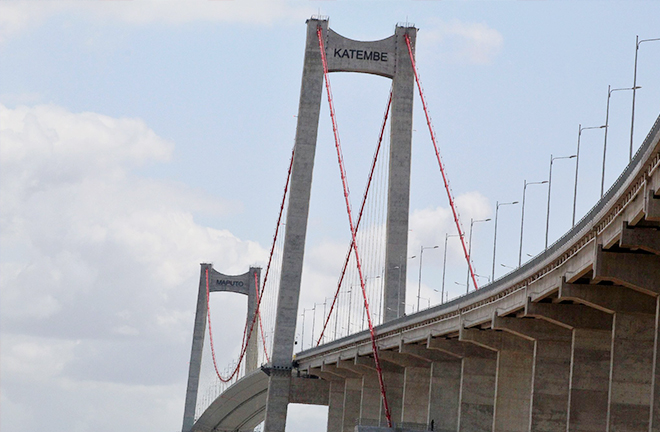China and Africa enjoy broad cooperation prospects

A section of the Chinese-built Maputo-Katembe Bridge in Mozambique, the longest suspension bridge in Africa Photo: CFP
At the recent Second Conference on Dialogue between Chinese and African Civilizations, scholars emphasized the great potential for cooperation between China and Africa in exploring modernization pathways and exchanging governance experience. Hosted by the China-Africa Institute under the Chinese Academy of Social Sciences (CASS), the conference was held on May 16–17 in Beijing under the theme of “Chinese Modernization and Africa’s Development Path.” CASS President Gao Xiang delivered a speech, and CASS Vice-President Zhen Zhanmin chaired the opening ceremony.
Broad prospects of cooperation
In his speech, Gao noted that civilizations exchange ideas because of their diversity, they learn from each other through exchanges, and they develop through mutual learning. The Global Civilization Initiative, which was recently proposed by General Secretary of the CPC Central Committee Xi Jinping, called for strengthening international people-to-people exchanges and cooperation. Implementing the initiative will open up vast space for the exchanges and mutual learning between the Chinese and African civilizations.
Gao stated that China supports African countries in exploring development paths that are tailored to their national conditions. Additionally, China is willing to share opportunities from its modernization with African partners, in order to jointly advance the modernization journey and build a China-Africa community with a shared future.
The exploration of modernization paths is a key aspect of the exchanges and mutual learning between Chinese and African civilizations. Both regions are committed to identifying development paths that align with their unique circumstances, resulting in historic achievements and ushering in a transitional new era, said Liu Yuxi, special representative of the Chinese government on African affairs. He added that the development advantages of China and Africa are highly complementary, signaling huge promise in mutually beneficial cooperation.
Ambassador Rahamtalla Mohamed Osman Elnor, African Union representative to China, said that Africa, the continent with the largest number of developing countries, is drawing inspiration from Chinese modernization, which has spurred African nations to vigorously pursue modernization and autonomous development.
China actively supports African countries’ independent development and has never interfered in their internal affairs, said Monday Semaya K. Kumba, ambassador of South Sudan to China. With China’s help, Africa has made continuous progress in economic and social development and become one of the fastest-growing regions in the world.
The accelerated construction of the African Continental Free Trade Area marks a crucial milestone in Africa’s push to achieve industrialization and modernization. According to Peter Kagwanja, chief executive of the Africa Policy Institute in Kenya, while Chinese and African modernization models stem from different civilizations and paths, they share common goals and directions.
Kagwanja noted that Africa has benefited from Chinese modernization and hopes to continue learning from China’s development experience, thereby jointly building a China-Africa community with a shared future.
High-quality Belt and Road cooperation
Promoting high-quality Belt and Road cooperation between China and Africa has provided a platform for practices in the exchanges and mutual learning between the two civilizations. Li Xiangyang, director of the National Institute of International Strategy at CASS, pointed out that the past decade has seen remarkable progress in the construction of the BRI. However, the initiative faces several challenges in terms of perception. He emphasized that China-Africa cooperation under the BRI framework is not merely about business transactions or foreign aid, but rather a unique, development-oriented regional economic cooperation mechanism.
The BRI is positively impacting the lives of African people, reducing poverty and reviving the economy on the continent, said Adetoro Banwo, deputy director of the Confucius Institute at the University of Lagos in Nigeria. A series of transnational interconnectivity projects, such as the Mali-Guinea railway and the Chad-Cameroon oil pipeline, have brought African countries together, and infrastructure projects like the Mombasa-Nairobi Railway, the Maputo-Catembe Bridge, and the Lagos-Kano Railway have strengthened links between the origins of raw materials and industrial regions, facilitated population flow, and created more development opportunities.
Looking forward, Liu Qian, deputy dean of the Belt and Road School at Beijing Normal University, said that to promote high-quality Belt and Road cooperation between China and Africa, unwavering efforts are needed to drive endogenous development in Africa through interconnectivity, and align the BRI with the African Union’s Agenda 2063 as well as with development strategies of African countries.
Moreover, it is essential to seize opportunities for green cooperation and step up investments in green infrastructure construction, “particularly enhancing cooperation on green economy and promoting the construction of the digital ‘Belt and Road,’” Liu Qian said.
Edited by CHEN MIRONG
